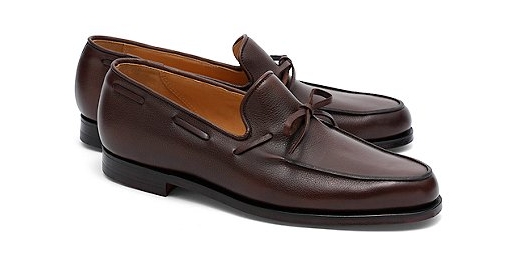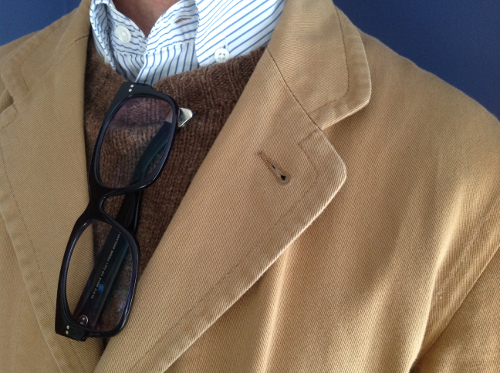Fox Brothers Week - Q & A Session with Douglas Cordeaux - Standard Bearer for Flannel
The Importance of Fox Brothers
Our Fox Brothers Week continues with an interview with Douglas Cordeaux, Managing Director at Fox Brothers. He acquired the Fox Brothers mill with Deborah Meaden in 2009, effectively and heroically saving Fox Brothers for the nation. Manufacturing names with a heritage as rich as Fox Brothers are easily as important as Turner, Wren or Keats, say, when considering the narrative and history of British culture.
Q & A with Douglas Cordeaux - Managing Director of Fox Brothers
With sharpened pencil and notepad at hand, Young Mrs Tweed probed Douglas Cordeaux in the latest of our
The Tweed Pig Q & A sessions
. The result is a nice insight into the world of Fox Brothers.Many thanks to Douglas for his time, and for providing such thoughtful responses.
How has Fox Brothers managed to survive for nearly 250 years?
Fox Brothers was established in 1772 and has seen some good times and some harder times in its company history, like any mill in the British Isles I suppose. When you consider that Fox used to employ around 5k people, which was down to just 15 when Deborah Meaden and I acquired the mill at the end of 2009 and now we’re back up to a team of 25, that puts into perspective the changes Fox has been through in its long history.
Now the last mill in the West Country, and there used to be lots, Fox has survived because of its world-class product. Fox is said to be the “Standard Bearer for Flannel”, for which it is credited with being the official originator last century.
Fox also has a unique position in a fiercely competitive global marketplace of being able to cope with bespoke orders for cloth. If they wish, we can give customers the ultimate choice, to design their own unique cloth, whether it is a lightweight flannel or a West of England tweed. There’s nowhere else you can do this, unless you own your own mill, of course!
What types of cloth do you produce?
Fine woollen and worsted cloth. We are world famous for our flannels and credited with being the original and still the best.Where is Fox Brothers most popular?
Fox is what is now referred to as a British heritage brand and sells well in Britain, major countries in Europe and particularly at the present time, in Japan, Korea and the Far East.What is your best-selling cloth?
We’re best known for our flannels and worsteds, but seasonally we see strong demand for a particular cloth or design depending on fashion and what’s going on in different markets amongst different brands. The Olympics has generated demand for bold stripes and blazer type cloths for next year, for instance.
How do you arrive at new designs? Or do you refer to your archives?
Both really, we do have a wonderful textile archive at Fox, described as “one of the most significant textile (company) archives in the British Isles”, which designers use for inspiration and to find interesting back stories behind a certain cloth to interest the consumer, but we also innovate to come up with new designs and finishes.What were the results of your appeal for the "Great British Fox Hunt"?
[Fox Brothers asked the public to help with compiling historic textile and document archives]Apart from a wonderful afternoon spent at the mill reminiscing with former employees like Gladys - the nursery nurse now in her 90’s, who used to run the crèche and was chatting to a former charge of hers; and the young gentleman from the Fox family itself, who bought his father’s magnificent overcoat made from Fox Brothers cloth - members of the public bought along all manner of clothing, letters, photographs and stories to share. The main purpose was to introduce ourselves as the new owners and to let the guests and the town’s Mayor, all of whom had or have a connection to Fox, know that we’re committed to Fox and its future.
Our chief designer Rosemarie was able to talk about the different things people had kept and cherished and we found out quite a lot about the way the mill used to be run.
Have preferences for particular cloths changed over time?
Looking through the archives you’re struck by how vibrant and daring gentlemen used to be with their suits, blazers and overcoats. Black and white photos and old books make it easy to forget just how colourful people were in the way they liked to dress.Over time the trend has been towards softer cloths and we’ve been able to move with the times, producing lightweight flannels suitable for more contemporary tastes.
How do you preserve Fox Brothers' heritage, yet continue to innovate?
We build on the heritage but as our archives show, have always been innovative, producing new cloths to appeal to changing tastes. ‘Serge’ for military puttees used to be a mainstay of the business, but unsurprisingly, we don’t make much of that any more!There are though perennial classics that never go out of fashion of course - chalk stripes, Prince of Wales, Glen check and tweed. These days people are surprised to know there’s such a thing as ‘West of England’ tweed. We’re the only mill left in the West Country, so the only ones left making this highly thought of tweed.
Tweedy's Thought: With Fox Brothers resurgent, it would be nice to see gentlemen being more vibrant and daring with their suits, blazers and overcoats once more.









